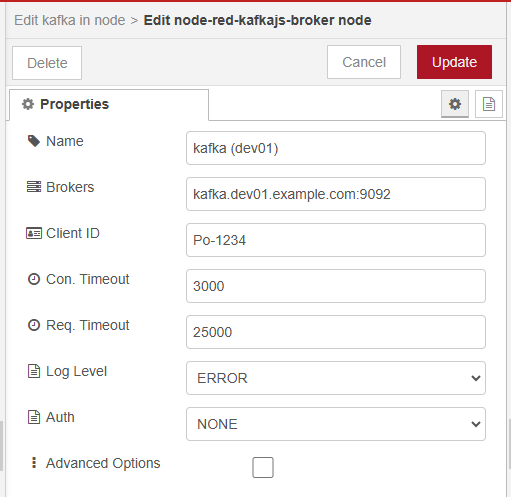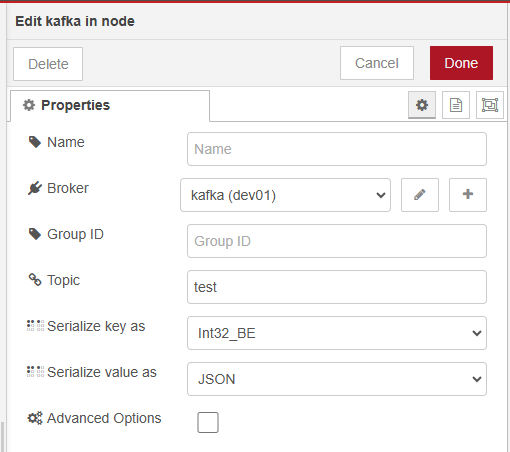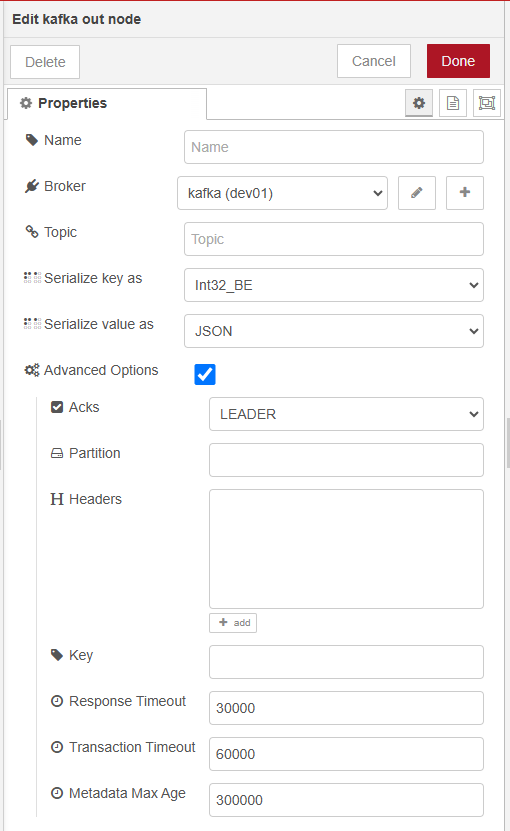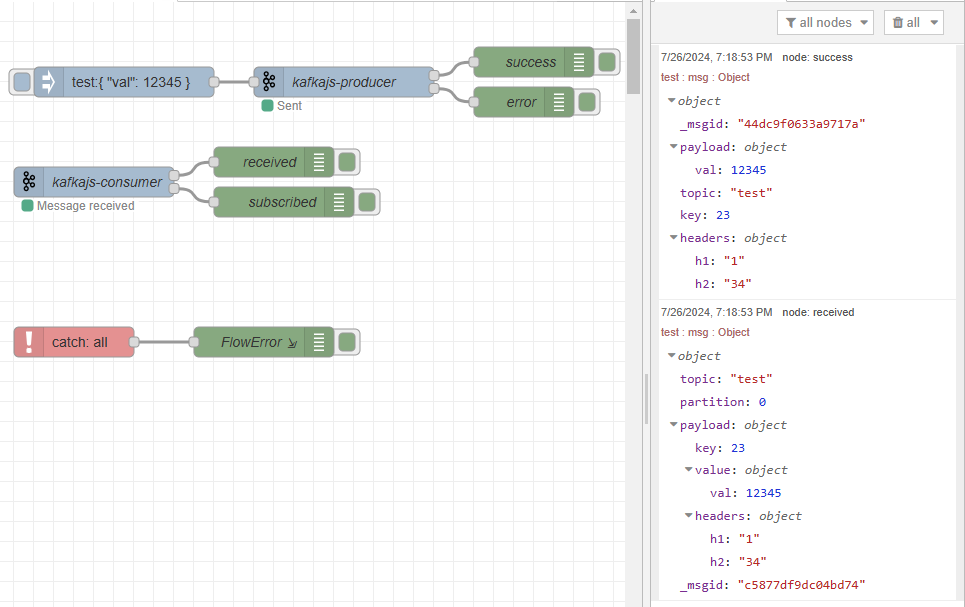@asinino/node-red-kafkajs 0.0.7
A package to comunicate with a Kafka server and lets the user control the flow of message pipeline to control success and failure on message synchronization.
node-red-kafkajs
[Note]
This repo is highly inspired on the repo at: https://github.com/amey0309/node-red-contrib-kafkajs It also depends on KafkaJS to do the basic functionality, you can find more info at: https://kafka.js.org/
[Note 2]
KAFKA is a registered trademark of The Apache Software Foundation. This project has no affiliation with and is not endorsed by The Apache Software Foundation.
With these nodes you can consume and produce messages to the Kafka broker and the big difference between this and the other projects found at Node-RED is better handling errors and node outputs to notify events. As the project at the top of this document, these nodes are a wrapper of the library KafkaJS, and it just pipes the data to the provided functionality of that library.
This library provides 3 nodes to make basic communication:
- kafkajs-broker
- kafkajs-producer
- kafkajs-consumer
It lets the flow send data to the Kafka Broker in the desired format and allows the user to send a Buffer object as the key and value of the message, this allows your flows to communicate with native data types if needed. It also provides a list of types that it can serialize automatically without the need to create an extra node for the data conversion, including serializing to JSON.
Advanced authentication is still missing tests, I'm rellying on the background projects.
Input Parameters
kafkajs-broker
- Name (Optional)
The name wanted to be shown in Node.
- Brokers
Brokers comma delimited (Multiple host is provided).
- Client ID
The ID of the client that is used to connect to Kafka Cluster.
- Request Timeout
Request timeout of Kafka Client.
- Connection Timeout
Connection timeout of Kafka Client.
- Log Level
Log level of Kafka Cient.
Authentication
- TLS
Check if TLS security is required for the Kafka Cluster.
* CA Certs (Optional)
CA Root certificate path defined in Kafka Cluster.
* Client Cert (Optional)
Client cert path created by OpenSSL derived from Private Key (pem).
* Private Key (Optional)
Private Key path created by OpenSSL (pem).
* Passphare (Optional)
A passphrase of created Private Key.
- SASL/PLAIN
Check if SASL auth is required for the Kafka Cluster.
* Mechanism
The method used to send authentication data to the server.
* Username
Username to connect to Kafka Cluster.
* Password
Password to connect to Kafka Cluster.
* Use SSL
Activate SSL Connection.
Advanced Retry Options
Advanced Retry Options of Kafka Client.
- Max. Retry
For automatic connection retry use a maximum wait time between retries, each retry will wait a bit more time. Value is in milliseconds.
- Init. Retry
For automatic connection retry start by using this delay between retries. Value is in milliseconds.
Factor
Multiplier
Retries
Maximum of retries until the client gives up.
kafkajs-producer
- Name (Optional)
The name wanted to be shown on your node.
- Broker
Broker which is wanted to be connected.
- Topic
Topic name of selected broker which is wanted to be consumed.
- Serialize key as
Make it easy to process the messages as it provides some basic serializers for the data received on msg key property.
- Serialize value as
Make it easy to process the messages as it provides some basic serializers for the data received on msg payload property.
- Advanced Options
Advanced options of Producer.
The node can receive a message (msg object above payload) with the following properties:
- msg.topic
The topic that will receive the message. It does not pre-validate if the partition exists, so use it with caution.
- msg.partition
If it's needed that a particular partition receives the messages you can set it here, it does not pre-validate if the partition exists, so use it with caution.
- msg.key
The key is associated with the message. Can be of type Buffer or some of the basic types supported by the provided serializers.
- msg.payload
Set to the value to be sent. Can be of type Buffer or some of the basic types supported by the provided serializers.
- msg.headers
Extra info that you can associate with the message. The key and values for the headers should be strings for now.
If some of these msg properties are set on the properties node, the node properties will prevail.
The node also provides two outputs so the flow can continue or react if the node succeeds or fails to send the message to the broker, this allows to cache of the messages not sent to be sent later or to log the error (the catch node will also trigger if any error is thrown by the node). The node outputs are:
- Triggered when the message was successfully sent.
- Triggered when some error occurred to send the message.
kafkajs-consumer
- Name (Optional)
The name wanted to be shown on your node.
- Broker
The broker to be connected to.
- Group ID
Group ID of consumer. If it is null, a custom ID will be generated for every connection.
- Topic
Topic name of selected broker which is wanted to be consumed.
- Serialize key as
Can make it easy to process the messages as it provides some basic serializers for the data received on msg key property.
- Serialize value as
Can make it easy to process the messages as it provides some basic serializers for the data received on msg payload property.
- Advanced Options
Advanced Options of the Consumer.
Installation
npm install @asinino/node-red-kafkajs
Screenshots




